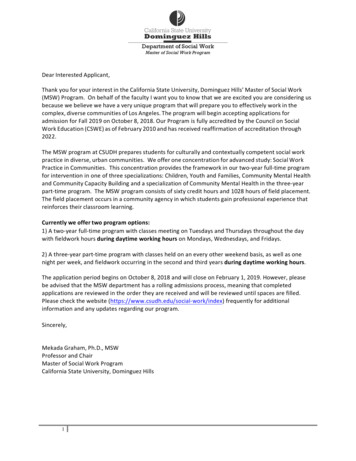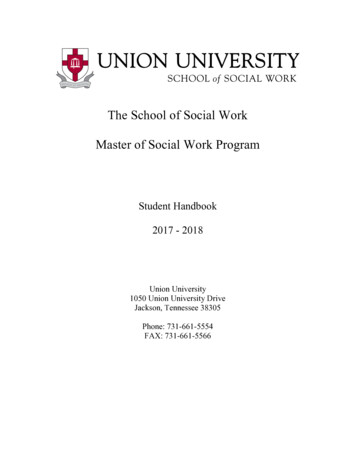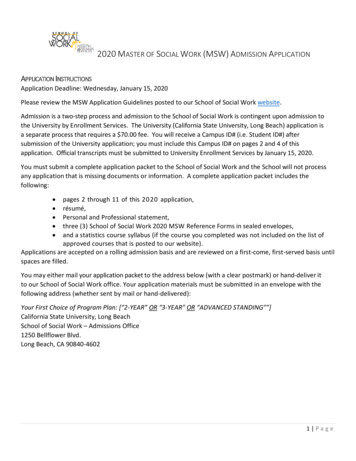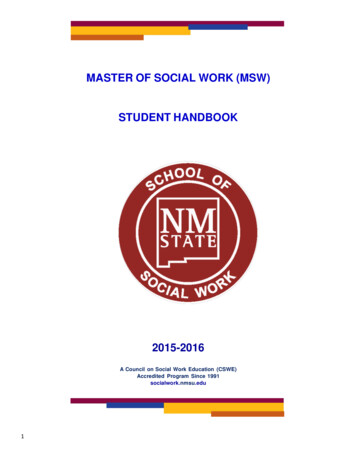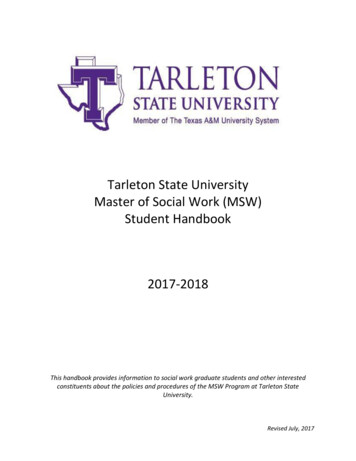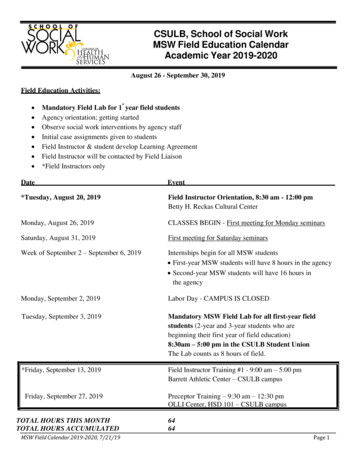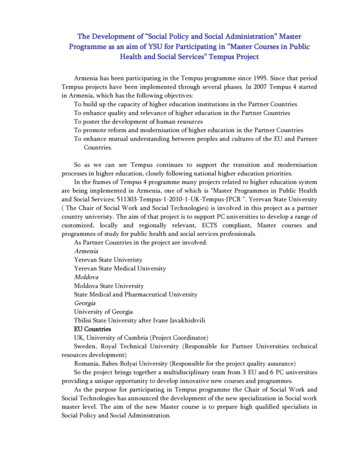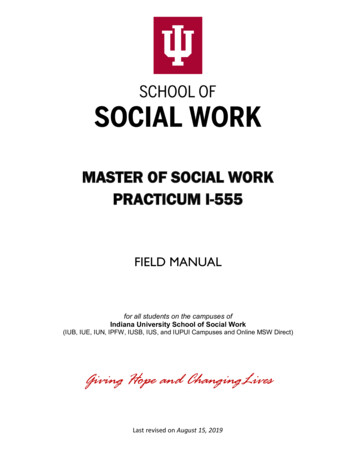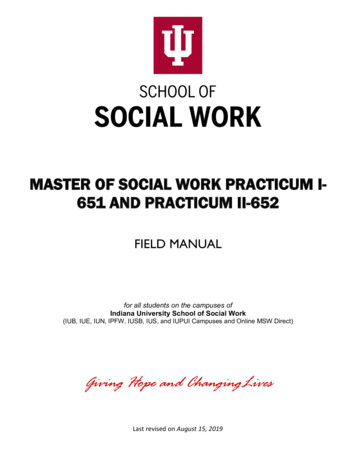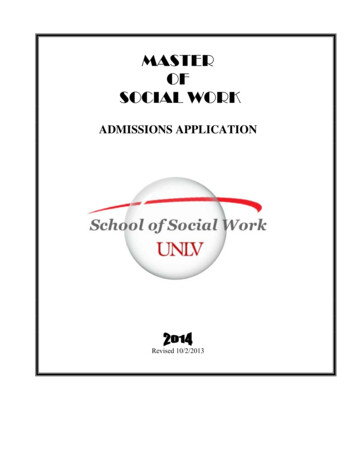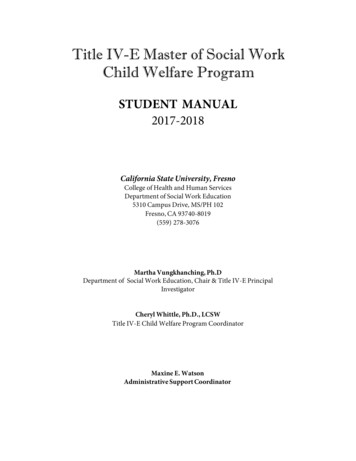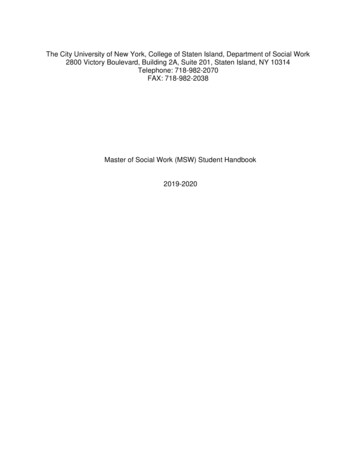
Transcription
The City University of New York, College of Staten Island, Department of Social Work2800 Victory Boulevard, Building 2A, Suite 201, Staten Island, NY 10314Telephone: 718-982-2070FAX: 718-982-2038Master of Social Work (MSW) Student Handbook2019-2020
Table of ContentsWelcome Message . 4Department Vision. 8Department Mission . 8Department of Social Work Goals . 8MSW Program Mission . 9MSW Goals . 9College of Staten Island Mission, Vision, & Values . 10History and Context . 12Policies to Assure Equal and Fair Treatment. 13Social Work Organizations, Standards, & Ethics . 15Behavioral Contract and Professional Dispositions . 16Admissions, Advisement, Retention, Termination . 17Academic Review Committee. 22MSW Curriculum . 26Study Plans . 30Students’ Rights and Responsibilities . 48MSW Student Representatives . 49Field Practicum Manual . 51Roles and Responsibilities . 52Field Supervisor . 58Expectations of Students . 62Field Practicum Policies . 65Field Evaluation . 68Appendix A NASW Code of Ethics . 70Appendix B MSW Competencies and Practice Behaviors. 94Appendix C Academic Integrity . 100Appendix D Behavioral Contract . 106Appendix E Independent Study . 110Appendix F Process Recordings . 1122
3
Welcome MessageDear MSW Students,It is our great pleasure to welcome you to the Master of Social Work (MSW)Program at the College of Staten Island, The City University of New York. The primarymission of social work is “to enhance human well-being and help meet the basic humanneeds of all people, with particular attention to the needs and empowerment of peoplewho are vulnerable, oppressed, and living in poverty” (NASW, 2017, p. 1). Through yoursocial work education, you will be taught the values, knowledge, and skills of theprofession, including advocacy and working to promote social justice in all areas ofsocial work practice. The field setting in which you complete your internship(s) willprovide the opportunity for you to integrate and apply your classroom education to thereal world.It is your responsibility to make the most of the education provided here at theCollege of Staten Island. The faculty will do our best to provide the resources you needto be successful, but you must be committed to learning and engaging in theeducational process. We hold each student to the highest standards of academicintegrity. We also hold each other responsible for ensuring that every participant in thiseducational endeavor is treated fairly and with respect and dignity. There can be nobystanders in social work—we are all accountable to and for each other.Please read this handbook carefully and in its entirety. Lack of familiarity with itscontent does not absolve you of responsibility for knowing its contents and adhering torequirements.We want you to succeed. You are our next generation of social workers to moveforward our quest for social and economic justice. Let us know if you need help or haveideas on how to ensure that your education prepares you to be the best social workeryou can be.Department of Social Work Faculty and Staff4
Faculty AdministratorsChristine Flynn Saulnier, MSW, PhD, LICSW (MA)Professor & Department ChairEmail: Christine.FlynnSaulnier@csi.cuny.eduPhone: (718) 982-2020Expertise: feminist theory; alcohol & drug problems; LGBT issuesBarbra Teater, MSW, PhDProfessor & Director, MSW ProgramEmail: Barbra.Teater@csi.cuny.eduPhone: (718) 982-2166Expertise: aging; social work education, research and theoryMayra Humphreys, MSW, PhD, LMSWAssociate Professor & DirectorBSSW ProgramEmail: Mayra.Humphreys@csi.cunny.eduPhone: (718) 982-2187Expertise: critical multiculturalism; social capitalFull Time FacultyAnjail Ameen-Rice, MSW, LCSWSubstitute LecturerEmail: Anjail.AmeenRice@csi.cuny.eduPhone: (718) 982-2189Expertise: developmental disabilitiesPaul Archibald, DrP, MSW, LCSW-C (MD)Associate ProfessorEmail: Paul.Archibald@csi.cuny.eduPhone: (718) 982-2174Expertise: stress-related health disparities;depression; substance use disorder treatment5
Vandana Chaudhry, MSW, PhDAssociate ProfessorEmail: Vandana.Chaudhry@csi.cuny.eduPhone: (718) 982-2191Expertise: disability theory and practicePatti Gross, MSW, LCSWLecturerEmail: Patti.Gross@csi.cuny.eduPhone: (718) 982-2196Expertise: clinical practiceKari Meyer, MSW, LMSWLecturer & Director Field EducationEmail: Kari.Meyer@csi.cuny.eduPhone: (718) 982-2170Expertise: macro practiceEsther Son, MSW, PhDAssistant ProfessorEmail: Esther.Son@csi.cuny.eduPhone: (718) 982-2074Expertise: developmental disability; health disparitiesStaffProfessional StaffConstance Stafford, MSW, LCSWManager of Professional Student ServicesEmail: Constance.Stafford@csi.cuny.eduPhone: (718) 982-2369Administrative StaffIlyssa Silfen, MAAdministrative CoordinatorEmail: Ilyssa.Silfen@csi.cuny.eduPhone: (718) 982-22046
Pasindu SeneviratneCollege AssistantEmail: Pasindu.Seneviratne@csi.cuny.eduPhone: (718) 982-20707
Department of Social WorkCollege of Staten Island, City University of New YorkDepartment VisionA world in which there is social and economic justice for all people.Department MissionThe Department of Social Work at the College of Staten Island, The City University ofNew York is committed to excellence in teaching, service, and the creation anddissemination of knowledge. We draw upon social constructionism to inform and guidetransformative social work practices. We strive to create an environment in which thehuman rights of all people are respected, diversity is embraced, and the values andethics of the social work profession are upheld. We provide graduates with theknowledge, skills, and values to dismantle oppression and injustice; foster human andcommunity well-being; and, create a world that is socially and economically just andequitable.Department of Social Work Goals:1. To educate social workers who have mastered the knowledge, skills, andvalues needed to employ critical thinking and transformative social workpractices with individuals, families, groups, organizations, and communities.2. To create and disseminate knowledge that informs transformative socialwork practices and/or social work education.3. To provide service to the Department, College, University, andcommunities that enhances the capacities of Staten Island and theregion.4. To cultivate an environment that attracts and fosters the success of diversefaculty, staff, and students.8
MSW Program MissionConsistent with the mission of the College and the values of the profession of socialwork, the Master of Social Work program at the College of Staten Island, The CityUniversity of New York is committed to excellence in teaching, service, and thecreation and dissemination of knowledge. The MSW program educates social workersat an advanced level from a critical disabilities perspective to employ transformativesocial work practices with people with disabilities. Acknowledging our globalinterconnectedness, we strive to understand and address the experiences of diversepeople and societies; foster human and community well-being; and create a world thatis socially and economically just and equitable.MSW Goals:1. Graduates will have the knowledge, skills, and values for advanced, urban,transformative social work practice with people with disabilities on StatenIsland, the region and beyond.2. Graduates will be competent, culturally sensitive advanced professionalpractitioners who engage with people to meet basic survival needs for food,clothing, shelter, and livelihood.3. Graduates will be able to apply advanced social work knowledge, skills andvalues to informed action with individuals, families, groups, organizations,communities, and the greater society.4. Graduates will have the advanced knowledge, skills, and values to worktoward a just and equitable society.5. Graduates will be motivated and prepared for advanced social workpractice with an understanding of the importance of continued selfreflection and professional development throughout their social workcareer.9
College of Staten Island Mission, Vision, & ValuesMissionGrounded in the Liberal Arts tradition, the College of Staten Island is committed to thehighest standards in teaching, research, and scholarship. Drawing on the rich heritageof The City University of New York that has provided access to excellence in highereducation since 1847, the College of Staten Island offers that same opportunity in NewYork City’s Borough of Staten Island. The College is dedicated to helping its studentsfulfill their creative, aesthetic, and educational aspirations through competitive andrigorous undergraduate, graduate, and professional programs. We embrace thestrength of our diversity, foster civic mindedness, and nurture responsible citizens forour city, country, and the world.VisionThe College of Staten Island will enhance the quality of its student-centered programs,research, scholarship, and creative works. The College will provide models forinitiatives on technology, community, and our environment, as well as effectiveintegration of programs, projects, and methodologies. The College will develop aricher array of rigorous undergraduate and graduate degree offerings to better meetstudents’ educational and professional aspirations. The College of Staten Island willexpand its role in The Graduate Center and other cross-campus activities of The CityUniversity of New York. We will become an even more vibrant center of intellectualand cultural exchange. The College will be strengthened by increasing its ability toserve a diverse campus community. Through these accomplishments, the College ofStaten Island will achieve greater regional, national, and international recognition.Values and Fundamental PrinciplesOur campus community values:Each StudentWe nurture each student’s intellectual growth, curiosity, and excitement in order toprepare students to function in a complex and dynamic world.Excellence in Research and TeachingWe set and meet high expectations in our academic programs through innovative andeffective teaching, scholarship, and research. We strive to promote engagementamong students and faculty.Experiential LearningWe believe it is essential to provide transformational curricular and co-curricularopportunities, such as service learning, study abroad, leadership development,10
undergraduate research and scholarship, and internships.ResourcefulnessWe take pride in our work ethic, our ability to solve problems, and our stewardship ofresources.Community EngagementWe actively work to instill the value of civic participation and are proud of ourleadership role for Staten Island and beyond. We foster partnerships to address publicissues and encourage involvement in community affairs.Our fundamental principles:DiversityDrawing from the richness of our diverse community, we incorporate multipleapproaches to developing and encouraging the inclusion of various worldviews,cultures, and experiences into the fabric of our institution.RespectIn our relationships with each other, we insist on mutual respect and thoughtfuldialogue. We provide forums for the exchange of ideas informed by the techniques ofcritical analysis and the traditions of scholarly discourse.IntegrityWe uphold the highest standards of honesty and fairness in our interactions with eachother.Pluralism and DiversityThe College of Staten Island’s Fundamental Principles and Focus on DiversityOur fundamental principles:Diversity: Drawing from the richness of our diverse community, we incorporatemultiple approaches to developing and encouraging the inclusion of variousworldviews, cultures, and experiences into the fabric of our institution.Respect: In our relationships with each other, we insist on mutual respect andthoughtful dialogue. We provide forums for the exchange of ideas informed bythe techniques of critical analysis and the traditions of scholarly discourse.Integrity: We uphold the highest standards of honesty and fairness in ourinteractions with each other.11
History and ContextThe College of Staten Island was established in 1976 when two branches of the CityUniversity of New York, Staten Island Community College, the first community collegein the University, and Richmond College, an upper division college offering bothbaccalaureate and graduate degrees, were merged. Today, the College remains theonly publicly funded four-year institution of higher learning on Staten Island. It currentlyoffers programs leading to associate degree, bachelor degree, master’s degrees in theliberal arts and sciences and in professional studies, and doctoral degrees inprofessional studies. The College of Staten Island cooperates with the GraduateCenter of the City University in additional programs with students pursuing doctoraldegrees.Since 1993 the College of Staten Island has been situated on a 204-acre campus inthe approximate middle of the Borough of Staten Island. This location was formerlyhome to the Willowbrook State School which, prior to its closing, was the largestinstitution for developmentally disabled people in the United States (at one pointhousing over six thousand residents). Conditions of abuse and neglect at WillowbrookState School were the subject of investigative reporting leading to the dissolution of theinstitution and to reforms and civil rights legislation for people with disabilities. With theclosing of this facility, residents were moved to community housing and many are stillliving in the Borough. Adjacent to the College of Staten Island are a few buildings fromthe original institution providing care for those persons with special needs who couldnot be placed in other settings. The relationship between the College and thecommunity of people with disabilities and their advocates on Staten Island continues tobe strong. The College of Staten Island prides itself on its overall commitment to thepeople of Staten Island, to the various agencies and programs, public and private, thatsupport a vital and growing population.Staten Island has nearly half a million residents and is a part of one of the mostopportunity-filled cities of the world, but it is often called the forgotten Borough,receiving less attention than the rest of New York City, in part, because of its locationand geographic isolation; it is the only area of the City not connected to theunderground train system. Commutes on local buses, including those routed to theStaten Island Ferry to Manhattan, may involve multiple connections. Four toll bridgesjoin Staten Island to Brooklyn and to New Jersey, but passage by car is expensive andtime-consuming. Consequently, most Staten Islanders tend to use needed services inthe Borough and rely heavily on the local schools, hospitals, and social service settingsin the community.As with all communities where access to needed resources is uneven, social problemsabound, but what is most remarkable about Staten Island, at this juncture, is its12
unparalleled growth in population: the population of foreign-born increased by 41% overthe past 15 years. Also, in terms of race and ethnicity, it is the most rapidly diversifyingborough. Staten Island has an enormous influx of new immigrants, many of whoseprimary language is not English and, consequently, who struggle to learn about theirnew environment and to access the resources that will assist them in adapting. Theborough is home to refugees fleeing civil war and political oppression as well as thosewho are simply seeking better lives and relief from extraordinary economic hardship.Nigerians and Pakistanis, Mexicans and Poles, Koreans and Russians, Haitians andChinese, all have substantial communities in the borough. Staten Island boasts one ofthe biggest Liberian communities in the United States and has the second largestAlbanian mosque in the country. The Asian population accounts for 30% of the foreignborn population of the borough, and the Hispanic population has increased 51%between the 2000 and 2010 census. The newcomers not only bring with them culturesthat have enriched the community but also pose many challenges for the programs onStaten Island, straining an already overburdened, underfunded, and inadequatelyprepared social service network.The College of Staten Island reflects the ethnic and racial diversity of the Borough,drawing the majority of its students from the local community, some from New Jersey,many from Brooklyn, and increasingly from the other Boroughs of New York City. TheSocial Work Department has an ethnically diverse student population. Over the pastfour years, students have emigrated from Albania, Russia, China, Ecuador, Liberia,Nigeria, India, Peru, The Dominican Republic, Haiti, Mexico, Kirghizstan, Ghana,Panama, Jamaica, and Trinidad. Numbers of social work students were born in PuertoRico. For students who are not of traditional college age or who are not native to thiscountry, the economic stressors are enormous. Most students find it necessary to workin jobs outside the home and have significant family responsibilities in addition to theiracademic responsibilities.Policies to Assure Equal and Fair TreatmentThe College of Staten Island is committed to the education of students in matters ofpluralism and diversity and the inclusion and support of students from variedbackgrounds in full productive participation both inside and outside the classroom. Thesocial wo
The City University of New York, College of Staten Island, Department of Social Work 2800 Victory Boulevard, Building 2A, Suite 201, Staten Island, NY 10314 Telephone: 718-982-2070 . FAX: 718-982-2038 . Master of Soci
